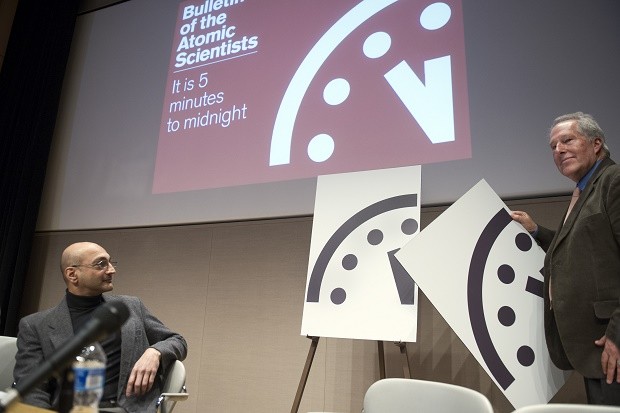Scientists: ‘Doomsday Clock’ reflects grave threat to world

In this Jan. 22, 2015, file photo, climate scientist Richard Somerville, member, Science and Security Board, Bulletin of the Atomic Scientists, right, unveils the new “Doomsday Clock,” accompanied by Sivan Kartha, member, Science and Security Board, Bulletin of the Atomic Scientists and senior scientists at the Stockholm Environmental Institute, right. Scientists behind a “Doomsday Clock” that measures the likelihood of a global cataclysm are set to announce Tuesday Jan. 26, 2016, whether civilization is any closer or farther from disaster. AP
WASHINGTON, United States — Nuclear threats and climate change pose strong threats to the planet and a symbolic “doomsday” clock will stay at three minutes to midnight, the Bulletin of the Atomic Scientists said Tuesday.
The clock serves as a metaphor for how close humanity is to destroying the planet, and was most recently moved closer to midnight in 2015.
“It remains the closest it has been over the past 20 years,” said Rachel Bronson, executive director of the Bulletin of the Atomic Scientists, during a press conference in the US capital.
READ: UN chief: World will be safer without nuclear weapons | UN believes Iran worked on developing nuclear weapons
Global warming, terrorism, nuclear tensions between the United States and Russia, concerns over North Korean weapons, tensions between Pakistan and India, and cyber threats remain destabilizing influences, said Lawrence Krauss, a cosmologist and professor at Arizona State University.
Article continues after this advertisementThe decision not to change the clock since 2015 is “not good news,” he told reporters.
Article continues after this advertisement“Unless we change the way we think, humanity remains in serious danger,” said Lawrence Krauss, chair of the bulletin’s Board of Sponsors.
Despite some positive news last year, including the Iran nuclear agreement and the Paris climate talks, experts expressed concern that global nuclear arsenals are growing and anti-pollution pledges lack teeth.
“The fight against climate change has barely begun, and it is unclear if the nations of the world are ready to make the many hard choices that will be necessary to stabilize the climate and avert possible environmental disasters,” said Krauss.
The decision to move the clock or not is led by the a group of scientists and intellectuals, including 16 Nobel Laureates.
The Doomsday Clock was created in 1947. It has changed 18 times since then, ranging from two minutes to midnight in 1953 to 17 minutes before midnight in 1991.
The last time it was three minutes to midnight was in 1983, when the Cold War between the United States and the Soviet Union was at its peak.